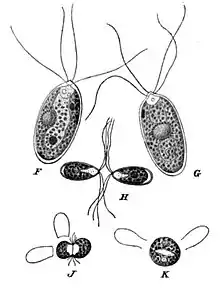| Carteria | |
|---|---|
 | |
| Carteria obtusa, Dill. F, G: Vegetative cells, H, J, K: Stages of gametes mating | |
| Scientific classification | |
| (unranked): | Viridiplantae |
| Division: | Chlorophyta |
| Class: | Chlorophyceae |
| Order: | Chlamydomonadales |
| Family: | Chlamydomonadaceae |
| Genus: | Carteria Diesing |
| Species | |
| |
Carteria is a genus of green algae in the family Chlamydomonadaceae.[1] Carteria are similar in morphology to the common genus Chlamydomonas and differ by having four, rather than two, flagella at the vegetative stage.[2]
The genus name of Carteria is in honour of Henry John Carter, (1813–1895), who was a surgeon working in Bombay, India, who carried out work in geology, paleontology, and zoology.[3]
The genus was circumscribed by Karl Moritz Diesing in Sitzungsber. Kaiserl. Akad. Wiss., Wien, Math.-Nat. Cl., Abt. Vol.1 Issue 52 on page 356 in 1866.
Description
Carteria is a single-celled organism. The cell is surrounded by a conspicuous wall which is often differentiated into a papilla at the anterior of the cell. There are four flagella, inserted at the location of the papilla, with a cruciate arrangement. Cells contain a single chloroplast. Pyrenoids are present, with one or several. There are often two contractile vacuoles per cell.[4]
Asexual reproduction occurs via zoospore formation within the parent cell wall.[2] The mode of sexual reproduction varies within Carteria: some species are isogamous, while Carteria obtusa is anisogamous.[5]
Taxonomy
Over seventy species of Carteria have been described from freshwater and terrestrial habitats.[4] The chloroplast shape is species-specific and provides the basis for classification.[6]
Among the 4-flagellate algae, various genera have been split off from Carteria based on morphological evidence. Among them are Provasoliella, which lacks pyrenoids,[7] and Pseudocarteria, which has multiple (more than two) contractile vacuoles dispersed throughout the cytoplasm.[8]
It is likely that additional research will lead to further revision of this genus.[6] Based on the ultrastructure of the flagellar basal bodies, Lembi et al. divided Carteria into two groups. Group I contains spherical cells with flagellar bodies oriented in a cross. Group II contains ellipsoidal cells with flagellar bodies oriented in a four-armed spiral.[9] Molecular data also agree with this grouping; the two groups together do not form a monophyletic group.[5]
References
- ↑ See the NCBI webpage on Carteria. Data extracted from the "NCBI taxonomy resources". National Center for Biotechnology Information. Retrieved 2007-03-19.
- 1 2 Nakada, Takashi; Nozaki, Hisayoshi (2014). "Chapter 6. Flagellate Green Algae". In Wehr, John D.; Sheath, Robert G.; Kociolek, J. Patrick (eds.). Freshwater Algae of North America: Ecology and Classification (2 ed.). Elsevier Inc. ISBN 978-0-12-385876-4.
- ↑ Burkhardt, Lotte (2022). Eine Enzyklopädie zu eponymischen Pflanzennamen [Encyclopedia of eponymic plant names] (pdf) (in German). Berlin: Botanic Garden and Botanical Museum, Freie Universität Berlin. doi:10.3372/epolist2022. ISBN 978-3-946292-41-8. Retrieved January 27, 2022.
- 1 2 Bicudo, Carlos E. M.; Menezes, Mariângela (2006). Gêneros de Algas de Águas Continentais do Brasil: chave para identificação e descrições (2 ed.). RiMa Editora. p. 508. ISBN 857656064X.
- 1 2 Suda, Shoichiro; Nozaki, Hisayoshi; Watanabe, Makoto M. (2005). "Morphology and sexual reproduction of Carteria palmata sp. nov. Belonging to the Carteria group I sensu Lembi (Chlorophyceae, Volvocales)". Phycologia. 44 (6): 596. doi:10.2216/0031-8884(2005)44[596:MASROC]2.0.CO;2. ISSN 0031-8884. S2CID 84790646.
- 1 2 Guiry, M.D.; Guiry, G.M. "Carteria". AlgaeBase. World-wide electronic publication, National University of Ireland, Galway. Retrieved 2023-12-24.
- ↑ Guiry, M.D.; Guiry, G.M. "Provasoliella". AlgaeBase. World-wide electronic publication, National University of Ireland, Galway. Retrieved 2023-12-24.
- ↑ Guiry, M.D.; Guiry, G.M. "Pseudocarteria". AlgaeBase. World-wide electronic publication, National University of Ireland, Galway. Retrieved 2023-12-24.
- ↑ Lembi, Carole A. (1975). "The fine structure of the flagellar apparatus of Carteria". Journal of Phycology. 11 (1): 1–9. Bibcode:1975JPcgy..11....1L. doi:10.1111/j.1529-8817.1975.tb02744.x. S2CID 85769935.